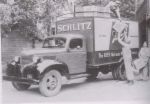An Unwritten Rule is Now Written.
I want you to imagine something, and just bear with me because I got angry about this all over again ( and its been over a year).....
You are the President or GM or VP (or in a Managament position) of a beverage company. Nearly all Beverage Companies are locally owned and operated. The folks running them are your neighbors, your friends. The men and women that manage the local Miller Distributor, Bud Distributor, Pepsi Bottler, Coke Bottler, etc., whether they like or not, are well known (think celebrities) in their respective communities. We donate our time and money so that our businesses are respected in these communites. We also pay our employees very well. Many hours are spent training these employees and these employees are given great benefits that rival any Fortune 500 company. We expect these employees to respect us, respect the job, and respect the products that we sell.
When I reread the article about the guy in Wisconsin getting fired for drinking a competitors product, I got pissed all over again. There is no excuse, whatsoever, for an employee of your company to support a competitor. You don't owe that employee any reason, he has disrepected the company and you. I like how the guy tried to make himself look like a victim to the paper. The brewery, obviously, was trying its best to be politically correct. Following is the Rule, feel free to put it in your employee handbook and call it the Heileman Rule for the Ignorant:
- Any employee caught consuming a competing product will be terminated on the spot.


